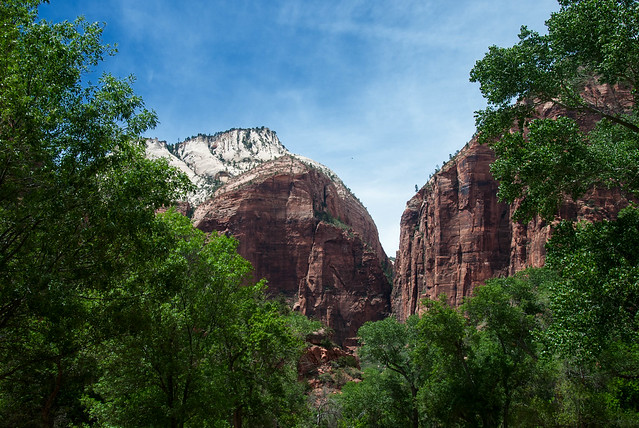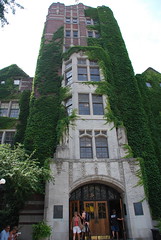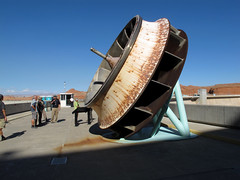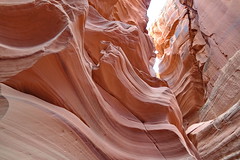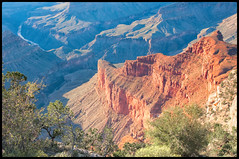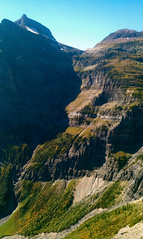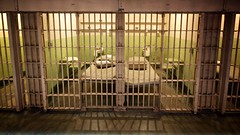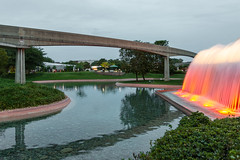 United States
United States
The United States of America (U.S.A. or USA), commonly known as the United States (U.S. or US) or America, is a country primarily located in North America. It consists of 50 states, a federal district, five major unincorporated territories, nine Minor Outlying Islands, and 326 Indian reservations. The United States is the world's third-largest country by both land and total area. It shares land borders with Canada to its north and with Mexico to its south and has maritime borders with the Bahamas, Cuba, Russia, and other nations. With a population of over 333 million, it is the most populous country in the Americas and the third most populous in the world. The national capital of the United States is Washington, D.C. and its most populous city and principal financial center is New York City.
Paleo-Americans migrated from Siberia to the North American mainland at least 12,000 years ago, and are the ancestors of modern Native Americans. Colonization by Europeans began in the 16th century. The native population declined after European arrival, primarily from diseases such as smallpox and measles, becoming increasingly displaced. Great Britain's Thirteen Colonies, in what is now the eastern U.S., quarreled with the British Crown over taxation and political representation, leading to the American Revolution (1765–1791). After the Revolution, the United States gained independence, the first nation-state founded on Enlightenment principles of liberal democracy. In the late 18th century, the U.S. began expanding across North America, gradually obtaining new territories; by 1848, it spanned the continent from east to west. Sectional division surrounding slavery in the Southern United States led to the secession of the Confederate States of America, which fought the remaining states of the Union during the American Civil War (1861–1865). With the Union's victory and preservation, slavery was abolished nationally by Thirteenth Amendment.
By 1900, the United States had established itself as a world power, becoming the world's largest economy. After Japan's attack on Pearl Harbor in 1941, the U.S. entered World War II on the Allied side. The aftermath of the war left the United States and the Soviet Union as the world's two superpowers and led to the Cold War. During the Cold War, both countries engaged in a struggle for ideological dominance but avoided direct military conflict. They also competed in the Space Race, which culminated in the 1969 American spaceflight, as a result of which the U.S. became the first and only nation to ever land humans on the Moon. Simultaneously, the civil rights movement (1954–1968) led to court rulings and legislation abolishing codified racial discrimination against African-Americans. With the Soviet Union's collapse and the subsequent end of the Cold War in 1991, the United States emerged as the world's sole superpower. In 2001, following the September 11 attacks, the United States became a lead member of the Global War on Terrorism.
The United States government is a federal republic with three separate branches of government, including a bicameral legislature. The U.S. is a liberal democracy and has a market economy. It ranks very highly in international measures of quality of life, income and wealth, economic competitiveness, human rights, innovation, and education; it has low levels of perceived corruption. The United States has the highest median income per person of any polity in the world, although it has high levels of incarceration and inequality and lacks universal health care. As a melting pot of cultures and ethnicities, the U.S. has been shaped by the largest immigrant population in the world.
A highly developed country, the American economy accounts for approximately a quarter of global GDP and is the world's largest by GDP at market exchange rates. By value, the United States is the world's largest importer and second-largest exporter. Although it accounts for just over 4.2% of the world's total population, the U.S. holds over 30% of the total wealth in the world, the largest share held by any country. The United States is a founding member of the United Nations, World Bank, International Monetary Fund, Organization of American States, NATO, and is a permanent member of the United Nations Security Council. The U.S. is the foremost military power in the world and a dominant political, cultural, and scientific force internationally.
Etymology
The first documentary evidence of the phrase "United States of America" dates back to a letter from January 2, 1776, written by Stephen Moylan to Joseph Reed, George Washington's aide-de-camp. Moylan expressed his wish to go "with full and ample powers from the United States of America to Spain" to seek assistance in the revolutionary war effort. The first known publication of the phrase "United States of America" was in an anonymous essay in The Virginia Gazette newspaper in Williamsburg, on April 6, 1776.
By June 1776, the name "United States of America" had appeared in drafts of the Articles of Confederation and Perpetual Union, prepared by John Dickinson and of the Declaration of Independence, written by Thomas Jefferson.
The phrase "United States" was originally plural in American usage. It described a collection of states—e.g., "the United States are..." The singular form became popular after the end of the Civil War and is now standard usage. A citizen of the United States is called an "American". "United States", "American", and "U.S." refer to the country adjectivally ("American values", "U.S. forces"). In English, the word "American" rarely refers to topics or subjects not directly connected with the United States.
History
Early history
It is generally accepted that the first inhabitants of North America migrated from Siberia by way of the Bering land bridge and arrived at least 12,000 years ago; however, some evidence suggests an even earlier date of arrival. The Clovis culture, which appeared around 11,000 BC, is believed to represent the first wave of human settlement of the Americas. This was likely the first of three major waves of migration into North America; later waves brought the ancestors of present-day Athabaskans, Aleuts, and Eskimos.
Over time, indigenous cultures in North America grew increasingly sophisticated, and some, such as the pre-Columbian Mississippian culture in the southeast, developed advanced agriculture, architecture, and complex societies. The city-state of Cahokia is the largest, most complex pre-Columbian archaeological site in the modern-day United States. In the Four Corners region, Ancestral Puebloan culture developed from centuries of agricultural experimentation. The Algonquian are one of the most populous and widespread North American indigenous peoples. This grouping consists of the peoples who speak Algonquian languages. Historically, these peoples were prominent along the Atlantic Coast and into the interior along the Saint Lawrence River and around the Great Lakes. Before Europeans came into contact, most Algonquian settlements lived by hunting and fishing, although many supplemented their diet by cultivating corn, beans and squash (the "Three Sisters"). The Ojibwe cultivated wild rice. The Haudenosaunee confederation of the Iroquois, located in the southern Great Lakes region, was established at some point between the twelfth and fifteenth centuries.
Estimating the native population of North America during European contact is difficult. Douglas H. Ubelaker of the Smithsonian Institution estimated a population of 93,000 in the South Atlantic states and a population of 473,000 in the Gulf states, but most academics regard this figure as too low. Anthropologist Henry F. Dobyns believed the populations were much higher, suggesting around 1.1 million along the shores of the Gulf of Mexico, 2.2 million people living between Florida and Massachusetts, 5.2 million in the Mississippi Valley and tributaries, and around 700,000 people in the Florida peninsula.
Colonial America
Claims of very early colonization of coastal New England by the Norse are disputed and controversial. Christopher Columbus had landed in Puerto Rico on his 1493 voyage, and San Juan was settled by the Spanish a decade later. The first documented arrival of Europeans in the continental United States is that of Spanish conquistadors such as Juan Ponce de León, who made his first expedition to Florida in 1513. The Italian explorer Giovanni da Verrazzano, sent by France to the New World in 1525, encountered Native American inhabitants of what is now called New York Bay. The Spanish set up the first settlements in Florida and New Mexico, such as Saint Augustine, often considered the nation's oldest city, and Santa Fe. The French established their own settlements along the Mississippi River and Gulf of Mexico, notably New Orleans and Mobile.
Successful English colonization of the eastern coast of North America began with the Virginia Colony in 1607 at Jamestown and with the Pilgrims' colony at Plymouth in 1620. The continent's first elected legislative assembly, Virginia's House of Burgesses, was founded in 1619. Harvard College was established in the Massachusetts Bay Colony in 1636 as the first institution of higher education. The Mayflower Compact and the Fundamental Orders of Connecticut established precedents for representative self-government and constitutionalism that would develop throughout the American colonies. Many English settlers were dissenting Christians who came seeking religious freedom. The native population of America declined after European arrival for various reasons, primarily from diseases such as smallpox and measles.
In the early days of colonization, many European settlers experienced food shortages, disease, and conflicts with Native Americans, such as in King Philip's War. Native Americans were also often fighting neighboring tribes and European settlers. In many cases the natives and settlers came to depen…
Looking for places related to United States?
Those are other destinations to find places related to United States:
